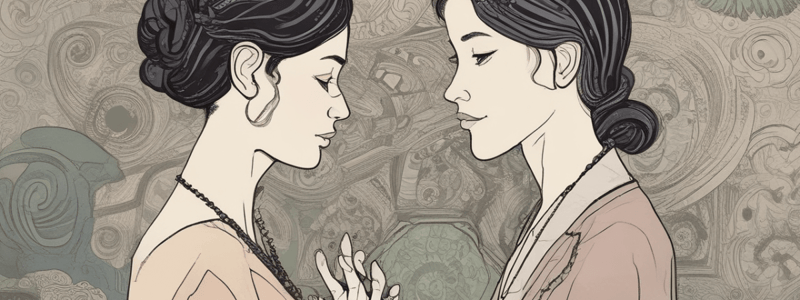Podcast
Questions and Answers
What is the life course according to sociology?
What is the life course according to sociology?
- The stages of life from birth to death (correct)
- The process of learning in a college
- The time spent in transitional adulthood
- The social significance of childhood
According to historian Philippe Aries, how were children represented in European paintings from A.D. 1000 to 1800?
According to historian Philippe Aries, how were children represented in European paintings from A.D. 1000 to 1800?
- Engaging in adult activities and dressed in adult clothes (correct)
- Engaging in adult activities and dressed in children's clothes
- Dressed in children's clothes and engaging in children's activities
- Dressed in adult clothes and engaging in children's activities
What is the age range for the stage of life referred to as Transitional Adulthood?
What is the age range for the stage of life referred to as Transitional Adulthood?
- Age 18 to 29 (correct)
- Age 65 and above
- Age 13 to 17
- Age 30 to 65
What is an implication of the life course for sociology according to the text?
What is an implication of the life course for sociology according to the text?
What does the life course vary depending on?
What does the life course vary depending on?
What is the significance of the life course?
What is the significance of the life course?
How do our perspectives on life change?
How do our perspectives on life change?
According to Keniston (1971), what is a characteristic of young individuals during their extended youth?
According to Keniston (1971), what is a characteristic of young individuals during their extended youth?
What is a common struggle many American women face during their early middle years?
What is a common struggle many American women face during their early middle years?
What is a key psychological shift that occurs in people during their later middle years?
What is a key psychological shift that occurs in people during their later middle years?
What is the term used to describe individuals in their later middle years who care for both their children and ageing parents?
What is the term used to describe individuals in their later middle years who care for both their children and ageing parents?
What is a characteristic of people in their later middle years that contributes to their overall satisfaction?
What is a characteristic of people in their later middle years that contributes to their overall satisfaction?
What is emerging as a new stage of life due to improvements in health and medicine?
What is emerging as a new stage of life due to improvements in health and medicine?
According to research, what is beneficial for maintaining mental sharpness in older adults?
According to research, what is beneficial for maintaining mental sharpness in older adults?
What was the typical age at which children left home in the past to pursue a career?
What was the typical age at which children left home in the past to pursue a career?
What was the view of children during the Industrial Revolution?
What was the view of children during the Industrial Revolution?
Why did adolescence become a distinct stage of life?
Why did adolescence become a distinct stage of life?
What is the purpose of initiation rites in tribal communities?
What is the purpose of initiation rites in tribal communities?
What is the characteristic of adolescence in modern culture?
What is the characteristic of adolescence in modern culture?
What is the name given to the new stage of life that is emerging in post-industrial nations?
What is the name given to the new stage of life that is emerging in post-industrial nations?
Why do millions of young people delay taking on adult responsibilities?
Why do millions of young people delay taking on adult responsibilities?
What is the primary factor that contributes to the increasing perception of old age to start at a later age?
What is the primary factor that contributes to the increasing perception of old age to start at a later age?
What is the term used to describe the period of life between retirement and old age?
What is the term used to describe the period of life between retirement and old age?
What is the finding of researchers regarding social networks and mental sharpness?
What is the finding of researchers regarding social networks and mental sharpness?
What is the percentage of men who continue to engage in sexual activity between the ages of late 60s and 75?
What is the percentage of men who continue to engage in sexual activity between the ages of late 60s and 75?
Why do people feel that 'time is closing in' on them more frequently throughout the older transitional years?
Why do people feel that 'time is closing in' on them more frequently throughout the older transitional years?
What is the role of the self in the process of socialization?
What is the role of the self in the process of socialization?
What is the significance of the self in shaping our behavior?
What is the significance of the self in shaping our behavior?
What is the primary reason why people's perspectives on life change as they age?
What is the primary reason why people's perspectives on life change as they age?
What is the implication of the finding that people who are more integrated into social networks maintain their mental sharpness?
What is the implication of the finding that people who are more integrated into social networks maintain their mental sharpness?
Study Notes
The Life Course
- The life course refers to the stages of life from conception to death, including childhood, adolescence, transitional adulthood, the middle years, and the older years.
- The life course has implications for sociology, as each stage has an impact on behavior and inclinations, and is shaped by social position, including gender, race, and social class.
Childhood (from birth to about age 12)
- Historian Philippe Aries (1965) argued that childhood was not seen as a significant phase of life in Europe during the Middle Ages, and children were treated as miniature adults.
- In contrast, modern society views children as delicate and innocent, requiring gentle guidance and care.
- The Industrial Revolution changed the way we view children, with parents and authorities seeing them as needing protection, comfort, and education.
Adolescence (age 13 to 17)
- Adolescence is not a natural age divide, but a societal construct that emerged with the Industrial Revolution.
- The Industrial Revolution created a surplus of material goods, making it possible for teenagers to delay entry into the labor market and focus on education.
- Adolescence is characterized by internal turmoil, as individuals struggle to find their identity and create their own subcultures.
Transitional Adulthood (age 18 to 29)
- Transitional adulthood is a new stage of life that is emerging in post-industrial nations, characterized by extended youth and delayed entry into adult responsibilities.
- During this stage, individuals may attend college, start their careers, and engage in courtship customs, while still trying to find themselves.
- Transitional adulthood is a time of extended youth, where individuals are neither psychological adolescents nor sociological adults.
The Middle Years (age 30 to 65)
- The early middle years (ages 30-49) are characterized by increased confidence and self-awareness, but also by shocks and ruptures, such as divorce and job loss.
- The later middle years (ages 50-65) are marked by a shift in thinking, from time since birth to time remaining to live, and a focus on health and mortality.
- Individuals may experience the "sandwich generation" phenomenon, where they care for both their children and ageing parents.
The Older Years (about age 65 on)
- The concept of old age is changing, with people viewing their 60s as an extension of their middle years rather than as old age.
- The older transitional years are a new stage of life, emerging between retirement and old age, where people are more integrated into social networks and maintain their mental sharpness.
- People in this stage may engage in more sex and find it more enjoyable, and may experience a sense of "time closing in" on them.
The Sociological Significance of the Life Course
- The life course has sociological significance, as it shapes our behavior and inclinations, and is influenced by social position and socialization.
- Each stage of life has its own unique characteristics, and is shaped by historical, geographical, and economic factors.
Are We Prisoners of Socialization?
- Sociologists do not view individuals as robots, passive recipients of socialization, but rather as active agents who create their own selves through experience and social interaction.
- While socialization has a significant impact on us, we are not prisoners of it, and can change our own selves within the constraints of our social environments.
- Our essential life orientations are established by our familial experiences, but we can deliberately expose ourselves to other ideologies and groups, and change our own selves in the process.
Studying That Suits You
Use AI to generate personalized quizzes and flashcards to suit your learning preferences.
Description
Explore the different stages of life, from childhood to older years, and how socialization affects our lives. Learn about the significance of socialization through the life course.


